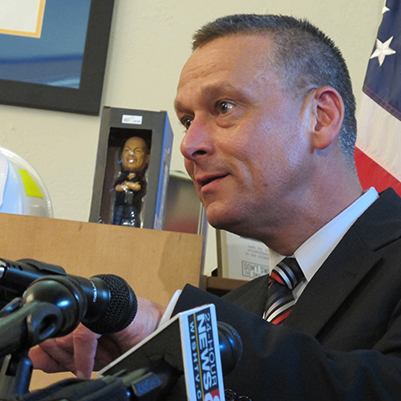What Commentary On Bennett A-F Emails Has Been Missing: Indiana Context

WFIU / WTIU News
On his last day in his Indiana office, former Superintendent of Public Instruction Tony Bennett discusses the education initiatives he pushed.
“Congrats,” writes Jonathan Plucker for Education Week, “you got rid of the great ed reform satan for good! Now what?”
Of course, he’s talking — and probably joking about the “satan” part — about former state superintendent Tony Bennett, who last month resigned from his job as Florida Commissioner of Education after the Associated Press released emails showing Bennett had changed school accountability grades here in Indiana.
Plucker spent a decade tracking state-level education policy as the director of Indiana University’s Center for Evaluation and Education Policy before leaving last fall for the University of Connecticut. He weighs in this week with some context for Bennett’s rise and fall:
The Tony Bennett I came to know is very different from the person depicted in the media and policy circles, both the fawning profiles and over-the-top criticism. I could write a book on the lessons learned, but here’s the abridged version:
Both sides are forgetting the Indiana context. Dr. Suellen Reed, Tony’s predecessor, learned that she had lost support within her party for a fifth term via Gov. Daniels’ press conference announcing his support for Tony’s nomination. That story may be apochryphal, but it quickly made the rounds and offended many, given Dr. Reed’s popularity and her status as one of the top Republican vote-getters during the “wilderness years” when Democrats controlled state politics for nearly two decades. People forget that the governor was polling in the 30s at that point and had many enemies within public education, enemies that Tony inherited. At the same time, parties returning to power after a generation often have a “reform wish list,” and they tend to be uncompromising at first. Battle lines were drawn early and firmly.
The haters emerged early and never relented. I was one of them. Within days of his election, rumors about Tony, many scandalous, began making their rounds among educators. My center began experiencing icy relations with the Indiana DOE. After a few frosty months, a mutual friend sat down with us and basically told us to get along. To my surprise, I liked the guy — he’s funny, smart, loves his family. We didn’t agree on everything, but he was open to debate, and from that point forward, we talked regularly. Although we gave each other a second chance, others weren’t so forgiving. I attended several meetings where Tony reached out to stakeholders, soliciting input or correcting misconceptions in the department’s positions. But his foes often left those meetings and publicly repeated the misconceptions, or declared that the department was not open to input.
Plucker writes that most of the commentary surrounding the Bennett emails has been “reasonable” (and, for his part, thinks Bennett was right to resign in Florida). But he also says many commentators have missed what he sees as the biggest lesson in the scandal.
“Focusing enmity on one elected official is almost always counterproductive. That’s easy to forget in today’s polarized political context,” he writes.
Plucker points out that the state legislature is actually more firmly Republican than it was when Bennett was in office, with a conservative governor. That could mean most of the Bennett-era education initiatives are probably safe.
But it’s worth noting that the legislature flagged the state’s A-F accountability system for a rewrite even before Bennett’s emails came to light. The Common Core academic standards the former superintendent championed are up for a review. And it’s unclear what standardized test Indiana students will take next.


